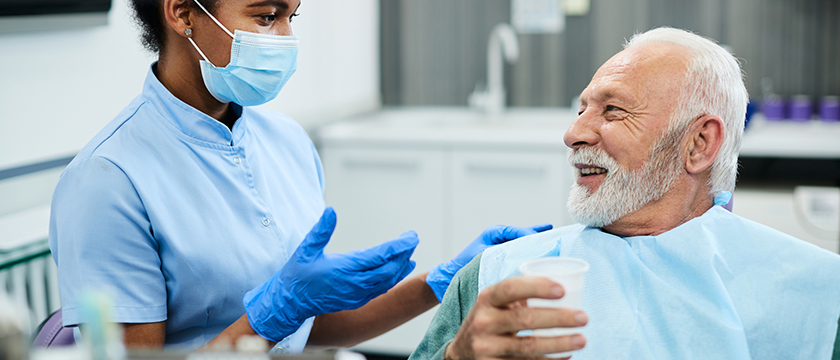 05 Jul 2023
05 Jul 2023
Visiting the dentist can be a stressful experience, but knowing the right questions to ask while you are there may help you to relax and make the most of your time with your oral health team. Here are a few questions we recommend you ask during your next visit to the best dentist in Mississauga.
11 Questions to Ask a Dentist in Mississauga
1. Do You Accept My Dental Plan?
If you have any form of dental insurance, ask the receptionist if their dental office accepts it. Checking this before you book your visit at the best dental clinic in Mississauga will ensure that you do not run into any unexpected financial barriers when pursuing treatment.
Ideally, a dental office will offer direct billing to your insurance, so you do not have to pay up-front. If they do not offer this service, be prepared to cover the cost on your own while you wait for reimbursement.
2. What’s the Best Way to Keep My Teeth Healthy?
Your dentist’s primary goal is to help you keep your teeth healthy, so ask them what you can do to work on your oral health. They may suggest steps like maintaining a consistent oral hygiene routine or eating a healthier diet with less added sugar.
3. What Should My Daily Dental Routine Be?
Similarly, ask your dentist what you can do each day to improve your dental health. In addition to brushing twice a day for at least two minutes each time and flossing at least once a day, they may also recommend steps like:
- Using fluoridated products like mouthwashes
- Avoiding food and drink high in sugar or acid
- Avoiding dark-coloured food and drink that could stain your teeth
- Eating a balanced diet with all the nutrients you need to maintain optimal tooth health
- Chewing sugar-free gum to stimulate saliva production
4. Will I Need an X-ray?
Dental X-rays help your dentist examine the inside of your teeth to determine if decay is present. Most people only need dental X-rays every few years. Ask your dentist if you are due for yours to ensure your records are up to date.
5. How Is My Overall Oral Health?
During your visit, your dentist will assess the state of your teeth, gums, and mouth tissues. They will screen you for problems like tooth decay and gum disease as well as more serious problems like oral cancer. After your examination is done, ask your dentist about their findings. Tell them as much as you can about your medical history and your family’s oral health history. This will let them know if you may be genetically susceptible to certain oral health problems.
6. Do I Have Any Cavities?
Dental cavities must be treated as early as possible to preserve tooth material. Ask your dentist if they have spotted any cavities during your physical exam or on your dental X-rays. If they have, you will likely need to book another appointment to get those cavities filled.
7. What Dental Products Do You Recommend for Me?
With myriad toothpastes, flossers, mouthwashes, and other dental products available on store shelves, it can be hard to determine which ones are best for your needs. Your dentist can provide guidance on this matter, recommending specific products to help you with aspects of your oral health routine. For instance, they may recommend high-strength fluoride toothpaste if you have a history of cavities or special orthodontic flossers if you are currently wearing braces.
8. Can I Get My Teeth Whiter?
If you have been hoping to brighten up your teeth, your dentist is the person to ask for help. There are many whitening products available, including toothpaste and mouthwashes, that will loosen up the surface stains on your teeth and make your smile look whiter. Your dentist may also recommend avoiding dark-coloured food and drink like tea, coffee, grape juice, tomato sauce, and other similar items.
If you are hoping for a truly dramatic whitening effect, your dentist may suggest an in-office teeth whitening treatment. These powerful chemical treatments can only be administered by a qualified professional, but they will produce far more impressive results than your standard over-the-counter whitening strips.
9. What Are the Signs of Gum Disease?
Gum disease is one of the leading causes of tooth loss. It takes root when your gums are exposed to bacteria over a long period of time. Eventually, the bacterial infection eats away at the bone below the gums and loosens the teeth.
While early-stage gum disease (called gingivitis) is reversible, its later stage (periodontitis) is not. Ask your dentist about early signs of gum disease, including bleeding, swollen or tender gums, pus between your teeth, and bad breath. Looking out for these symptoms will help you get the problem treated before it gets worse.
10. How Do I Prevent Bad Breath?
Bad breath is a very common problem that dentists can help with. Your dentist may recommend brushing your teeth more frequently or using an antibacterial mouthwash. They may also suggest more frequent cleanings to keep tartar from building up inside your mouth.
11. How Often Should I Schedule a Visit?
Most people need to see their dentist every six months to maintain good oral health. Depending on your oral health history, you may need to visit yours more frequently. Ask your dentist about this, making sure that they know of any oral health conditions you have, such as periodontal disease.
Get All Your Questions Answered at Your Family Dentist’s Office

If you are ready to see a dentist, contact Trillium Smile Dentistry. Dr. Tousi has been touted as one of the best dentists in Mississauga by reviews. Contact our office today and let our reception team book you in for an appointment to see her and learn exactly why she is held in such high regard.
